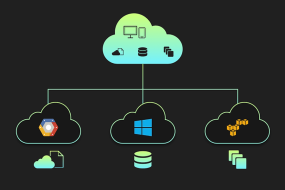
As we delve into the world of cloud hosting, it’s essential to understand the three primary categories: public, private, and hybrid clouds. These cloud deployment models serve distinct purposes, catering to a wide array of requirements across various industries.
Public Cloud Hosting: Unveiling the Power
Public clouds are like the bustling city centers of the digital world. They are accessible to the public and hosted by third-party providers, allowing users to tap into their vast resources. Providers like Amazon Web Services (AWS), Microsoft Azure, and Google Cloud offer computing power, storage, and applications on a pay-as-you-go basis. This affordability and scalability make public clouds a top choice for startups and small businesses. The key advantage of public clouds lies in their accessibility and scalability. They provide a convenient way to expand computing resources during traffic spikes without heavy investments in hardware. However, security and compliance can be concerns, making them less suitable for highly regulated industries like healthcare or finance.
Private Cloud Hosting: Securing Your Space
On the other end of the spectrum, private clouds are like exclusive, members-only clubs. They are dedicated to a single organization, whether on-site or hosted by a third-party provider. The primary goal of a private cloud is to ensure data security, compliance, and full control over resources. Private clouds are ideal for enterprises with sensitive data, where compliance with regulations like HIPAA or GDPR is mandatory. They offer enhanced security and customizable environments but come at a higher cost than public clouds.
Hybrid Cloud Hosting: The Best of Both Worlds
Hybrid clouds are the harmonious blend of public and private clouds, offering the best of both worlds. They allow data and applications to move seamlessly between the two environments, giving organizations the flexibility to balance performance, cost, and security. This approach is perfect for businesses with varying workload demands. For example, a company can use a public cloud for data processing and a private cloud for confidential client information. The ability to adapt to changing needs is the hallmark of hybrid cloud hosting.
Key Differences: Public vs. Private vs. Hybrid Clouds
- Accessibility: Public clouds are open to all, private clouds are exclusive, and hybrid clouds offer a combination.
- Cost: Public clouds are cost-effective, private clouds come at a premium, and hybrid clouds offer a balance.
- Security: Public clouds may raise security concerns, private clouds provide a higher level of control, and hybrid clouds offer a tailored approach.
Benefits of Cloud Hosting
- Scalability: Easily scale resources up or down based on demand.
- Cost Efficiency: Pay only for what you use in public clouds.
- Security: Private clouds offer enhanced security features.
- Flexibility: Hybrid clouds provide adaptability to changing needs.
Use Cases for Public Clouds
Web Hosting: Host websites and web applications with ease.
Development and Testing: Quickly set up and tear down environments.
Big Data Processing: Handle vast amounts of data in real-time.
Disaster Recovery: Ensure data backups and recovery solutions.
Use Cases for Private Clouds
Sensitive Data Handling: Protect healthcare or financial information.
Regulatory Compliance: Comply with industry-specific regulations.
Customization: Tailor the environment to your exact needs.
Hybrid Cloud in Real Life: Success Stories
Major enterprises like Netflix, NASA, and Adobe have embraced hybrid cloud solutions. Netflix, for example, utilizes the public cloud for content delivery and a private cloud for sensitive customer data.
Challenges and Considerations
While cloud hosting offers numerous advantages, it’s crucial to address potential challenges such as data security, compliance, and the cost of scaling in public clouds. Organizations must carefully consider their unique requirements before deciding on a cloud strategy.
Future Trends in Cloud Hosting
The cloud hosting landscape is ever-evolving. Trends for 2023 and beyond include edge computing, increased adoption of serverless computing, and the continued growth of containerization technologies like Kubernetes.
Final Words
In a tech-centric world, understanding the dynamics of cloud hosting is paramount. Public, private, and hybrid clouds each offer a unique set of benefits and challenges. To make the most informed decisions, tech enthusiasts and decision-makers should carefully assess their requirements and consider the dynamic nature of the technology landscape.
Commonly Asked Questions
- Q: Is a hybrid cloud the right choice for my small business? A: Hybrid clouds can benefit businesses of all sizes, but their suitability depends on your specific needs and budget.
- Q: Are public clouds secure for storing sensitive data? A: Public clouds can be secure, but they require robust security measures and compliance checks.
- Q: What are the main cost factors to consider in cloud hosting? A: Consider factors like storage, data transfer, and computing power when assessing costs.
- Q: How can I ensure data portability in a hybrid cloud setup? A: Choose cloud providers that offer compatibility and migration tools to facilitate data movement.
- Q: What’s the role of containers in modern cloud hosting? A: Containers, like Docker and Kubernetes, are pivotal in simplifying application deployment and management in cloud environments.
Advertisement







